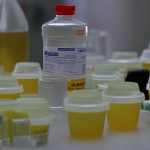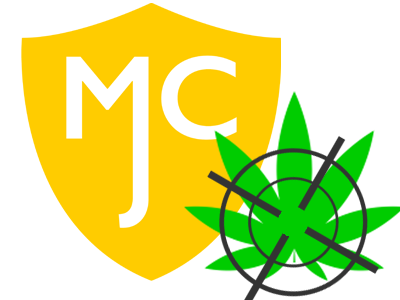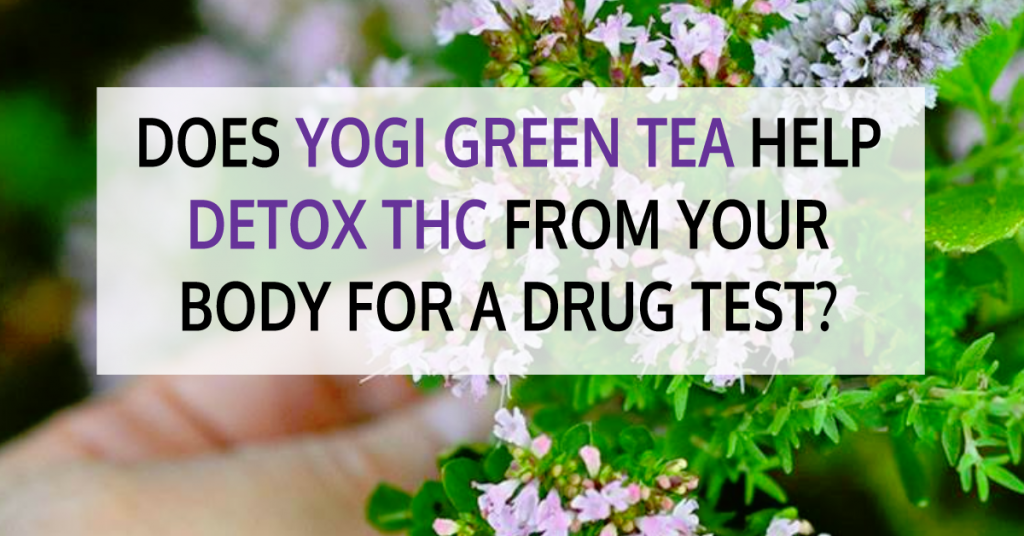
Green tea has emerged as a popular contender in the realm of marijuana detoxification for drug testing. As experts in the field, we have delved into the potential benefits of green tea in eliminating THC and reducing its concentration in urine samples. The detox properties of green tea are believed to support the body’s natural cleansing processes, making it an intriguing option for individuals facing drug testing challenges.
Key Takeaways:
- Green tea has gained popularity as a potential aid in marijuana detoxification for drug testing.
- It is believed that green tea can help flush out THC from the body and reduce its concentration in urine samples.
- The detox properties of green tea may support the body’s natural detoxification processes.
- Further research is needed to better understand the effectiveness and mechanisms of green tea in detoxification.
- Consult with a healthcare professional before incorporating green tea or any other detoxification method into your routine.
Do Detox Teas Really Work?
Detox teas, including those marketed for weight loss, often make false promises and may not be effective in detoxifying the body. Many detox teas contain diuretics, which can lead to increased urination and the loss of water weight. However, this does not necessarily result in actual fat loss or the removal of substances like THC from the body. Additionally, using detox teas to pass a drug test is not reliable, as many drug tests can detect diluted samples and elevated levels of certain substances.
While detox teas may be popular for their alleged detoxification properties, it’s important to approach them with caution and consider their limitations. The weight loss experienced from these teas is primarily due to the loss of water weight, which can be quickly regained once the individual rehydrates. Detox teas are not a long-term solution for detoxification and should be used in combination with other strategies, such as maintaining a healthy lifestyle and allowing adequate time for natural cleansing processes.
“Detox teas may promise rapid weight loss and detoxification, but their effectiveness in truly eliminating toxins from the body is questionable. Many of these teas contain diuretics, which can lead to temporary water weight loss but do not address the underlying issue of toxin elimination.”
In addition to false promises and limited effectiveness, detox teas may also have potential risks and side effects. Some individuals may experience gastrointestinal discomfort, such as bloating or cramping, as a result of consuming detox teas. Furthermore, certain detox teas may interact with medications or pre-existing medical conditions, potentially causing adverse effects. It is important to consult with a healthcare professional before incorporating detox teas into a detoxification regimen.
In summary, while detox teas may be marketed as effective tools for detoxification and weight loss, their claims should be taken with caution. These teas primarily lead to temporary water weight loss and may not effectively eliminate substances like THC from the body. It is important to be aware of the limitations and potential risks associated with detox teas, and to consider alternative strategies for detoxification.
The Science Behind Green Tea’s Cleansing Abilities
Green tea has long been recognized for its health benefits, including its potential to support detoxification. The key to green tea’s cleansing abilities lies in its rich concentration of antioxidants, particularly catechins. These antioxidants play a crucial role in neutralizing free radicals in the body, which can contribute to various illnesses and diseases.
Antioxidants in green tea, such as epigallocatechin gallate (EGCG), have been shown to promote overall well-being and aid in the body’s natural detoxification processes. They help protect cells from damage caused by harmful toxins and pollutants, allowing the body to function optimally. By reducing oxidative stress, green tea can support the liver, kidneys, and other organs involved in detoxification.
Incorporating green tea into a healthy lifestyle can have numerous benefits beyond detoxification. It is known to boost the immune system, improve cardiovascular health, and enhance cognitive function. Additionally, green tea contains caffeine, which can provide an energy boost and improve focus throughout the day.
“The powerful antioxidants found in green tea can contribute to a healthier lifestyle and support the body’s natural detoxification processes. By incorporating green tea into your daily routine, you can reap its numerous health benefits and enhance your overall well-being.”
| Benefits of Green Tea: | How It Supports Detoxification: |
|---|---|
| 1. Antioxidant-rich | Neutralizes free radicals and protects cells from damage |
| 2. Enhances liver function | Aids in the breakdown and elimination of toxins |
| 3. Boosts immune system | Supports overall wellness and detoxification processes |
| 4. Improves cardiovascular health | Reduces the risk of heart disease and supports circulation |
| 5. Provides natural energy | Contains caffeine for an energy boost and improved focus |
Incorporating green tea into your daily routine can be as simple as brewing a cup of hot tea or opting for cold-brewed green tea as a refreshing beverage. To maximize the benefits, choose high-quality, organic green tea and avoid adding excessive sugar or sweeteners. Remember, green tea is just one part of a healthy lifestyle, and maintaining a balanced diet and regular exercise routine are equally important for overall well-being.
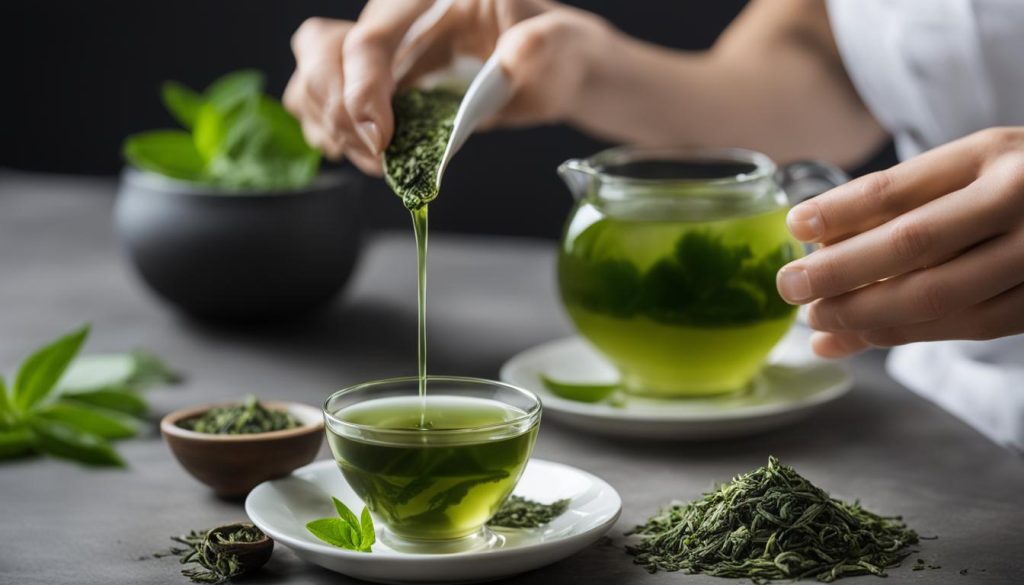
THC Detox Drinks: Understanding Their Composition and Effectiveness
THC detox drinks have gained popularity as a potential solution for individuals seeking to eliminate THC and its metabolites from their bodies. These drinks are specifically designed to support the body’s natural detoxification processes, particularly in the urinary system. To understand their effectiveness, it is essential to examine the composition of these drinks and how they work.
Table:
| Ingredients | Function |
|---|---|
| Water | Promotes hydration and urine production |
| Electrolytes | Supports optimal functioning of the urinary system |
| Herbal Extracts | May have diuretic and detoxification properties |
| Vitamins and Minerals | Provides essential nutrients for overall health |
These drinks typically contain a combination of water, electrolytes, herbal extracts, vitamins, and minerals. Water plays a crucial role in promoting hydration and increasing urine production, which can help flush out toxins, including THC metabolites. Electrolytes maintain the balance of fluids in the body and support optimal functioning of the urinary system.
The herbal extracts found in THC detox drinks may have diuretic properties, promoting increased urine output and potentially aiding in the elimination of THC metabolites. Additionally, these extracts may possess detoxification properties, supporting the body’s natural detox processes. The inclusion of vitamins and minerals in these drinks ensures that the body receives essential nutrients during the detoxification process.
While THC detox drinks can be a useful tool in supporting the body’s natural detoxification processes, their effectiveness may vary depending on individual factors such as cannabis use frequency and overall health status. It’s important to note that these drinks should not be solely relied upon for detoxification but should be used in combination with other strategies, such as maintaining a healthy lifestyle and allowing adequate time for natural cleansing processes.
Advantages and Disadvantages of THC Detox Drinks
THC detox drinks offer several advantages for individuals seeking to pass a drug test. One of the key benefits is their quick and convenient nature. These drinks are designed to be easily consumed, allowing for a hassle-free detoxification process. Additionally, THC detox drinks can support the body’s natural detoxification processes. They are formulated with ingredients that promote liver function, hydration, and urine production, facilitating the elimination of THC and its metabolites.
However, it is important to consider the limitations and disadvantages of THC detox drinks. While they can be effective in the short term, they are not a long-term solution for detoxification. These drinks should be used in combination with other strategies, such as maintaining a healthy lifestyle and allowing adequate time for natural cleansing processes. Additionally, the effectiveness of THC detox drinks may vary depending on individual factors such as cannabis use frequency and overall health status.
“THC detox drinks offer quick and convenient detoxification, supporting the body’s natural processes.”
Overall, THC detox drinks provide a convenient option for individuals who need to pass a drug test quickly. They can support the body’s natural detoxification processes and aid in the elimination of THC and its metabolites. However, it is important to approach these drinks with a realistic understanding of their limitations and to supplement their use with other detoxification strategies.
| Advantages | Disadvantages | |
|---|---|---|
| Quick and Convenient | Supports natural detoxification | Not a long-term solution |
| Easily consumed | Effectiveness may vary |
Natural Drinks to Help Eliminate THC Metabolites
When it comes to eliminating THC metabolites from the body, there are several natural drinks that may offer potential benefits. Incorporating these drinks into a detoxification regimen may help support the body’s natural cleansing processes and aid in the elimination of THC metabolites. Some of these natural drinks include:
- Lemon water: Lemon water is known for its detoxification properties and can help hydrate the body, promoting urine production and the elimination of toxins.
- Dandelion root tea: Dandelion root tea is believed to have diuretic effects, which can increase urination and potentially facilitate the elimination of THC metabolites from the body.
- Green tea: Green tea is rich in antioxidants and may contribute to overall detoxification. It can support the body’s natural cleansing processes and promote general well-being.
- Apple cider vinegar: Apple cider vinegar has been used for its potential detoxification benefits. It may help flush out toxins from the body and support overall health.
- Ginger tea: Ginger tea is known for aiding digestion and promoting detoxification. It may assist in eliminating THC metabolites by supporting the body’s natural cleansing processes.
- Coffee: Coffee is a popular beverage that may offer temporary diuretic effects, potentially increasing urine production and aiding in the elimination of THC metabolites.
It’s important to note that while these natural drinks may have potential benefits, their effectiveness can vary depending on individual factors such as metabolism, overall health, and cannabis use habits. Additionally, it’s recommended to consult with a healthcare professional before integrating these drinks into a specific detoxification regimen, especially if you have any underlying health conditions or are taking medications.
To provide a comprehensive overview, here is a table summarizing the key attributes of these natural drinks:
| Drink | Potential Benefits |
|---|---|
| Lemon water | Detoxification properties, hydration, urine production |
| Dandelion root tea | Diuretic effects, increased urination |
| Green tea | Rich in antioxidants, supports natural detoxification |
| Apple cider vinegar | Potential detoxification benefits, overall health support |
| Ginger tea | Aids digestion, promotes detoxification |
| Coffee | Temporary diuretic effects, increased urine production |
Note: The effectiveness of these drinks may vary, and individual results can differ based on various factors such as metabolism, overall health, and cannabis use habits. Consult with a healthcare professional before integrating these drinks into a specific detoxification regimen.
Risks and Regulations Associated with Drug Tampering Kits
Drug tampering kits, which are often used to manipulate urine drug test results, pose significant risks and are not regulated by state or federal authorities. These kits utilize various techniques, including in vivo adulteration (altering ingested substances), urine substitution, and in vitro adulteration (manipulating the urine sample itself). However, it is important for both clinicians and individuals to be aware of the potential dangers and inadequate regulation surrounding these kits, as they can lead to false-negative drug test results and compromise the accuracy of the testing process.
In Vivo Adulteration
One method used with drug tampering kits is in vivo adulteration, which involves altering the substances ingested to manipulate the drug test results. This can include consuming certain substances or medications that may interfere with the detection of drugs in the urine. However, this technique is risky and can have unpredictable outcomes. It is essential to recognize that in vivo adulteration is not a foolproof method and can lead to inaccurate test results.
Urine Substitution
Another technique employed with drug tampering kits is urine substitution, where individuals replace their own urine with someone else’s or with a synthetic urine sample. This can be done using various methods, such as using prosthetic devices or hiding pre-collected urine. However, urine substitution is not only unethical but also highly detectable by drug testing laboratories. Modern drug tests have advanced mechanisms to identify adulterated or substituted samples, increasing the risk of potential legal consequences.
In Vitro Adulteration
In vitro adulteration refers to the manipulation of the urine sample itself using additives or dilution methods. This technique aims to alter the urine’s composition to affect the accuracy of the drug test. However, laboratories are equipped with advanced technologies that can detect these adulterants, making it a high-risk strategy. It is important to note that the potential consequences of using drug tampering kits and engaging in illicit practices can significantly outweigh any short-term benefits.
| Risks Associated with Drug Tampering Kits | Regulation of Drug Tampering Kits |
|---|---|
| – False-negative drug test results | – Lack of regulation by state and federal authorities |
| – Legal consequences for tampering with drug tests | – Absence of standardized quality control measures |
| – Compromised accuracy and reliability of drug testing | – Potential harm to individuals’ health |
In conclusion, the use of drug tampering kits carries significant risks and is not regulated by state or federal authorities. Practices such as in vivo adulteration, urine substitution, and in vitro adulteration can lead to false-negative drug test results and compromise the accuracy of the testing process. It is crucial for clinicians and individuals to be aware of these risks and the potential legal consequences associated with tampering with drug tests. State and federal authorities should implement regulations to ensure the safety and accuracy of drug testing procedures.
The Problem of Drug Test Tampering
Drug test tampering has become a significant issue, with a parallel industry focused on providing products and techniques to subvert the results of drug tests. This illicit practice poses challenges in accurately detecting drug use and can potentially lead to false-negative results. The lack of regulation from state and federal authorities only exacerbates the problem, allowing the parallel industry to thrive unchecked.
The subversion of drug test results through tampering techniques is a concern for employers, clinicians, and law enforcement agencies alike. The use of drug tampering kits, which employ various methods such as in vivo adulteration (altering substances ingested), urine substitution, and in vitro adulteration (manipulating the urine sample itself), allows individuals to bypass detection and present false-negative results.
The subversion of drug test results through tampering techniques is a concern for employers, clinicians, and law enforcement agencies alike.
The lack of regulation in this area further complicates the issue. Currently, there are no specific regulations governing drug tampering kits, allowing manufacturers and distributors to operate with minimal oversight. This lack of regulation not only facilitates the availability of these kits but also hinders the development of effective measures to combat drug test tampering.
| Type of Tampering | Description |
|---|---|
| In vivo adulteration | Alteration of substances ingested to interfere with drug test results |
| Urine substitution | Replacement of urine sample with a clean sample |
| In vitro adulteration | Manipulation of the urine sample itself to mask drug presence |
The problem of drug test tampering requires immediate attention and action from regulatory bodies. Implementing stringent regulations and monitoring the manufacturing and distribution of drug tampering kits can help curb the parallel industry and reduce the prevalence of false-negative drug test results. Additionally, raising awareness among employers, clinicians, and individuals about the risks and consequences of tampering with drug test results is crucial in combating this illicit practice.
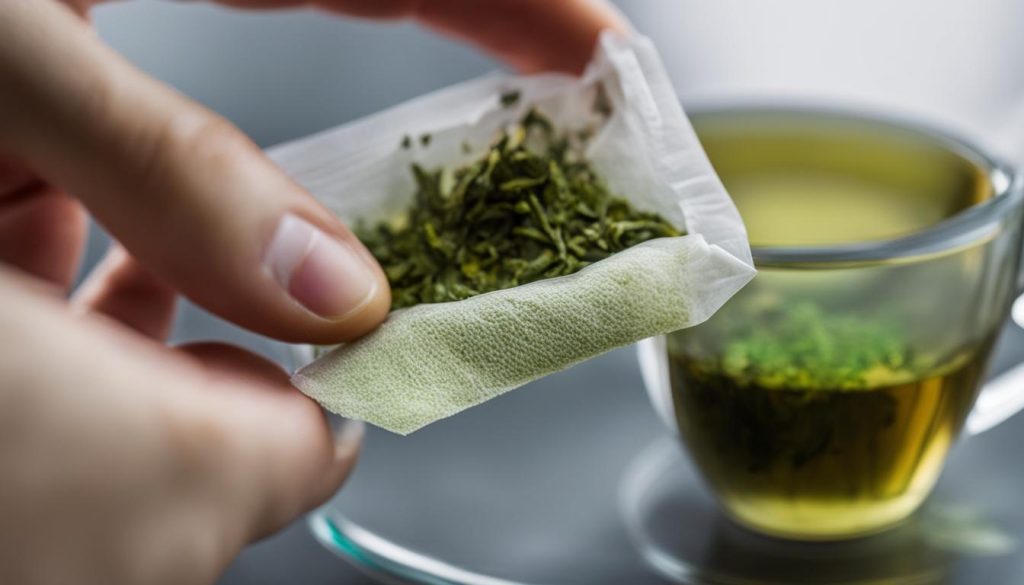
The Problem of Drug Test Tampering
Potential Dangers of Detoxification Kits and Supplements
Detoxification kits and supplements are widely marketed as a means to cleanse the body of toxins, including those from drugs and alcohol. However, it is important to be aware of the potential dangers associated with these products and the lack of regulation in the industry. Many detoxification kits and supplements contain ingredients that can cause liver dysfunction and hepatotoxicity. These include cascara sagrada, green tea, milk thistle, and guarana. Without proper regulation and dose specifications, these products can pose risks to individuals’ liver health and overall well-being.
The lack of regulation in the detoxification industry is a significant concern. Unlike pharmaceutical drugs, detoxification kits and supplements are not required to undergo rigorous testing or approval processes before being sold to the public. This means that their safety, efficacy, and quality control cannot be guaranteed. Individuals may unknowingly consume products that contain harmful ingredients or incorrect dosages, leading to adverse health effects.
Moreover, the use of detoxification kits and supplements for drug test tampering adds an additional layer of risk. By attempting to manipulate the results of a drug test, individuals may resort to using these products without fully understanding the potential consequences. This can further compromise their liver function and overall health, while also potentially leading to false-negative drug test results.
| Potential Dangers of Detoxification Kits and Supplements | Recommendations |
|---|---|
| Liver dysfunction and hepatotoxicity | Consult with a healthcare professional before using detoxification kits or supplements; opt for natural detoxification methods under medical supervision. |
| Lack of regulation | Be cautious when purchasing detoxification products; look for reputable brands and consult healthcare professionals for guidance. |
| Risks of drug test tampering | Avoid using detoxification kits or supplements for the purpose of manipulating drug test results; adhere to legal and ethical practices. |
In conclusion, detoxification kits and supplements pose potential dangers due to the lack of regulation and the hepatotoxicity of certain ingredients. It is crucial to consult with healthcare professionals before using these products and to opt for natural detoxification methods under medical supervision. The industry requires greater regulation to ensure the safety, efficacy, and quality control of detoxification products. As individuals, we should prioritize our health and well-being by making informed choices and seeking professional guidance when it comes to detoxification.
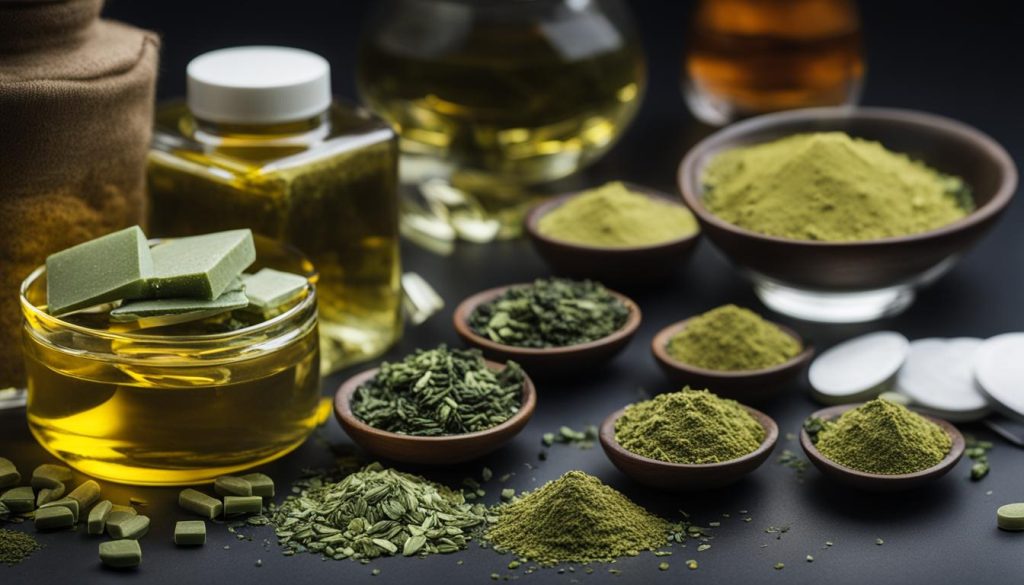
The Importance of Clinician Awareness and Education
When it comes to urine drug tests, clinician awareness and education play a crucial role in ensuring accurate results and minimizing risks. False-negative urine drug tests can have serious consequences, leading to potential psychiatric and medical complications for patients. By staying informed and vigilant, clinicians can better identify potential signs of drug test manipulation and take appropriate actions.
Clinician awareness involves staying up to date with the latest techniques used for drug test tampering and understanding the risks associated with these practices. It is essential for clinicians to recognize the signs and symptoms of false-negative urine drug tests, as well as the potential complications that may arise from undetected substance abuse.
Education is equally important in equipping clinicians with the knowledge and tools to address the challenges posed by drug test tampering. By understanding the different methods employed to manipulate urine drug tests, clinicians can develop strategies to identify and prevent tampering attempts. Furthermore, education can help clinicians provide accurate information to patients about the risks and consequences of engaging in such practices.
The Role of Clinicians
Clinicians have a responsibility to advocate for patient safety and ensure the integrity of drug testing procedures. By actively engaging in ongoing education and staying updated on the latest advancements in drug testing technologies, clinicians can play a vital role in preventing false-negative urine drug tests and reducing the potential for psychiatric and medical complications.
Through their awareness and education efforts, clinicians can also contribute to the development of policies and regulations that address the issue of drug test tampering. By collaborating with state and federal authorities, clinicians can help promote the implementation of comprehensive regulations that safeguard the accuracy and reliability of drug testing procedures.
| Benefits of Clinician Awareness and Education | Risks of Ignoring the Issue |
|---|---|
| Early detection and intervention for substance abuse | Potential misdiagnosis and inadequate treatment |
| Improved patient care and safety | Increased risk of adverse drug reactions |
| Prevention of potential complications and relapses | Failure to detect and address underlying addiction issues |

“Clinician awareness and education are paramount in ensuring the accuracy and reliability of urine drug tests. By staying informed and educated, clinicians can effectively identify signs of drug test manipulation and minimize the risks of false-negative results. This is crucial for providing the best possible care to patients and addressing any underlying substance abuse issues.”
The Need for Further Research and Regulation
In order to address the potential dangers associated with drug test subversion techniques and products, further research and regulation are essential. Currently, there is limited scientific evidence and understanding of the effectiveness and risks of these methods. Therefore, conducting additional studies will provide valuable insights into the impact of drug tampering kits and detoxification supplements on drug testing accuracy and individual health.
Furthermore, the regulation of these products is necessary to protect public safety and ensure the integrity of drug testing procedures. The lack of oversight and standardization in the production and distribution of these products poses significant risks to individuals who may rely on them to manipulate drug test results. State and federal authorities must work together to establish clear guidelines and regulations to address these concerns.
“Without proper research and regulation, individuals may unwittingly subject themselves to health risks and inaccurate drug testing results.”
Moreover, the potential dangers associated with drug test subversion highlight the urgent need for public awareness and education. Many individuals may unknowingly attempt to manipulate drug test results without fully understanding the potential consequences. Through comprehensive education and outreach programs, clinicians, employers, and the general public can gain a better understanding of the risks involved and make informed decisions regarding drug testing and detoxification methods.
Further Research and Regulation Goals
In order to address the complex issue of drug test subversion and protect public health and safety, further research and regulation should aim to achieve the following:
- Conduct in-depth studies to evaluate the effectiveness and risks of drug tampering kits and detoxification products.
- Establish clear guidelines and regulations for the production, distribution, and use of these products.
- Enhance public awareness and education about the dangers and limitations of drug test subversion techniques.
- Collaborate with state and federal authorities to implement comprehensive measures that prioritize accurate and reliable drug testing.
Conclusion
In conclusion, the role of green tea in marijuana detoxification for drug testing remains a topic of interest. While green tea may potentially aid in reducing THC metabolite concentrations and supporting the body’s natural detoxification processes, it is important to approach detox teas and tampering kits with caution.
Detox teas, including those marketed for weight loss, often make false promises and may not effectively detoxify the body. Drug tampering kits pose risks and are not regulated by state or federal authorities, potentially leading to false-negative urine drug test results.
Given the risks and limitations associated with these products, further research and education in the field is necessary. Clinicians should be aware of the potential for false-negative urine drug tests and the risks associated with using these techniques. Additionally, regulation by state and federal authorities is crucial to ensure the safety and accuracy of drug testing procedures.
FAQ
Can green tea help with marijuana detoxification for drug testing?
Green tea is believed to have detox properties that may support the body’s natural detoxification processes, but it is not a guaranteed solution for eliminating THC from the body.
Do detox teas actually work for detoxification?
Detox teas, including those marketed for weight loss, often make false promises and may not be effective in detoxifying the body. Many detox teas contain diuretics, which can lead to increased urination and water weight loss, but this does not necessarily result in the removal of substances like THC from the body.
What are the benefits of green tea for detoxification?
Green tea contains antioxidants that can promote overall detoxification and support a healthy lifestyle. These antioxidants help fight against free radicals in the body and contribute to overall well-being.
How effective are THC detox drinks?
THC detox drinks can vary in effectiveness depending on individual factors such as cannabis use frequency and overall health status. They can support natural detoxification processes by providing hydration, electrolytes, and certain herbal extracts.
What are the advantages and disadvantages of THC detox drinks?
THC detox drinks offer convenience and support for natural detoxification processes, but they are not a long-term solution and should be used in combination with a healthy lifestyle. There is no guarantee that they will help you pass a drug test, as many tests can detect diluted samples and elevated levels of certain substances.
Are there any natural drinks that can help eliminate THC metabolites?
Some natural drinks, such as lemon water, dandelion root tea, green tea, apple cider vinegar, ginger tea, and coffee, may have properties that aid in the elimination of THC metabolites. It’s important to consult with a healthcare professional before integrating these drinks into a detoxification regimen.
What are the risks of using drug tampering kits?
Drug tampering kits can be used to manipulate urine drug test results, but they are not regulated by state or federal authorities. There are risks associated with their use, including potential false-negative test results and complications to one’s health.
How significant is the problem of drug test tampering?
The use of drug tampering kits to subvert urine drug test results has become a significant issue. There is a parallel industry focused on providing products and techniques to manipulate drug tests, with little to no regulation from state or federal authorities.
Are detoxification kits and supplements safe to use?
Detoxification kits and supplements, including those used for drug test tampering, can potentially be dangerous due to the lack of regulation and potential hepatotoxicity of certain ingredients. They may contain ingredients that can cause liver dysfunction and pose risks to one’s health.
Why is clinician awareness and education important regarding drug test tampering?
Clinicians need to be aware of the techniques used for drug test tampering and the potential for false-negative urine drug test results. Education on these matters can help clinicians provide better care and support for individuals who may have manipulated drug test results.
What is the need for further research and regulation in this area?
The extent of use of drug tampering kits and the potential dangers associated with them require further research. There is a need for more studies on the effectiveness and risks of these techniques, as well as the regulation of products and supplements used for drug test subversion.





